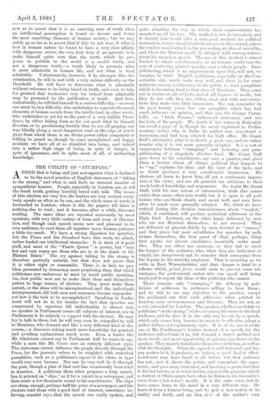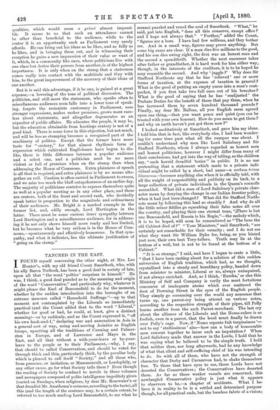THE UTILITY OF "STUMPING."
AGOOD deal is being said just now against what is declared to be the novel practice of English statesmen of "taking to the stump," and what is said finds an unusual number of sympathetic hearers. People, especially in London, are, to tell the frank truth, getting horribly bored with talk. The issues of this election are very few, the leaders are very excited, every- body speaks as often as he can, and the whole mass of words is forwarded to London, where it fills the papers till there is nothing else to read ; and it becomes, after a while, tiresome reading. The same ideas are repeated necessarily by most -speakers, with very little variety of form and even of illustra- tion, and though each speech seems new and pleasant to its own audience, to read them all together taxes human patience a little too much. We have a strong digestion for speeches, but the Times and the Standard have this week, we admit, rather loaded our intellectual stomachs. It is most of it good stuff, and most of the "Faerie Queen" is poetry, but "very few and very weary are those who are in at the death of the Blatant Beast." The cry against taking to the stump is therefore perfectly natural, but that does not prove that it is either right or reasonable. There is, in fact, no pro- blem presented by democracy more perplexing than that which politicians now endeavour to meet by much public speaking, viz., how public men are to make their ideas and themselves patent to huge masses of electors. They must make them
• patent, or the ideas will be misunderstood, and the individuals misrepresented, till both men and measures become unpopular yet how is the task to be accomplished P Speaking in Parlia- ment will not do it, for besides the fact that speeches are compressed by reporters till individuality is almost lost, no speaker in Parliament covers all subjects of interest, nor in Parliament is he entirely en rapport with his electors. He may try to talk to them, but he will very soon be compelled to talk to Members, who demand and like a very different kind of dis- course,—a discourse taking much more knowledge for granted, and avoiding explanations much more. Even a leader like Mr. Gladstone cannot say in Parliament half he wants to say, while a man like Mr. Cross uses an entirely different style. The statesman cannot influence the people directly through the Press, for the journals refuse to be weighted with oratorical pamphlets, such as a politician's expos6 of his views in type would very soon become. Nor can he very well do it through the post, though a plan of that sort has occasionally been tried in America. A politician there often prepares a long speech, has it printed on "slips," as if for a report in a newspaper, and then sends a few thousands round to his constituents. The slips are cheap enough, perhaps half the price of a newspaper, and the electors read them with a good deal of interest, sometimes be- lieving, scandal says, that the speech was really spoken, and quite admiring the way in which their representative has smashed up all his foes. The method is not inconvenient, and if cleverly done would offer a very good medium for political instruction ; but we should doubt its success in this country, where the readers would attach to the proceeding an idea of unreality, and where the Member would be deluged with correspondence about his unspoken speech. The use of this method is almost limited to single constituencies, as no fortune could bear the cost of scattering printed speeches over a whole people. Pam- phleteering, which is an improvement upon this, will not, we imagine, be tried. English politicians, especially on the Con- servative side, rarely write very well, and there is, for some unknown reason, a reluctance in the public to read pamphlets which is becoming fatal to that class of literature. They come out in dozens on all subjects, and of all degrees of merit ; but they do not sell, they are seldom read, and with rare excep- tions they make very little impression. We can remember in the past twenty years but one pamphlet which has had much influence on opinion, and that one, Sir George Camp- bell's on "Irish Tenure," influenced statesmen, and not the body of the people. We doubt if ten voters in Kirkcaldy can recall a page of it, though its merit explained to Parlia- mentary cynics why in India its author was considered a statesman, and had been selected for high office. Mr. Grant Duff's alternative plan is no doubt a good one, and we rather wonder why it is not more generally adopted. It is a sort of compromise between " stumping " and lecturing and pam- phleteering of a singularly effective kind. Mr. Grant Duff goes down to his constituents, say once a quarter, and gives them a lecture about all things political that happen to be "up," explains his ideas and his view of the facts, and no doubt produces a very considerable impression. His electors all learn to know him, all get a continuous impres- sion of his views, and are all grateful for additions to their stock both of knowledge and arguments. No doubt Mr. Grant Duff, with his rare extent of information, finds this course easier than many other men would, but it is open to all poli- ticians who can think clearly and speak well, and may here- after be much more generally adopted. We think we have noticed during this election remonstrances about "neglect," which, if continued, will produce periodical addresses of the Elgin kind. Lectures, on the other hand, delivered by men who are not Members themselves, do not succeed. They are delivered at present chiefly by men devoted to "causes," and they prove but poor substitutes for speeches by poli- ticians themselves, the best proof of that, perhaps, being that agents for absent candidates invariably make mud- dles. They are either too cautious, or they fail to catch the temper of the audience, who, when they are indiscreet or stupid, are dangerously apt to transfer their annoyance from the deputy to his unlucky employer. That is occurring as we write in East Worcestershire, and that danger is fatal to a scheme which, prima, fade, would seem to present some ad- vantages, the professional orator who can speak well being employed to report the ideas of the politician who cannot.
There remains only "stumping," the delivery by poli- ticians of addresses to audiences willing to hear them ; and we fail to see any objection to the practice, except the accidental one that such addresses, when printed in London, seem over-numerous and tiresome. They are not, as a rule, intended for London. The speaker, whether candidate or politician "on the stump," wishes to convey his views to his local audience, and he does it in the only way he can, by a speech, which only seems long because he must, to be effective, adopt a rather diffuse and explanatory style. It is of no use to recite one of Mr. Fonblanque's leaders instead of a speech, for the audience will not take it in, but demand a slower method and more words, and more opportunity of gaining experience of the speaker. They want to familiarise themselves with him, as well as with his thoughts. When the speech is well delivered, and has any matter in it, it produces, we believe, a good deal of effect. Londoners may have heard it all before, but that audience has not ; and it cheers the points, and remembers the argu- ments, and goes away contented, and knowing a great deal that it did not before, or at worst having enjoyed the pleasure which a student of Shakespeare feels when he listens to his favourite's verse from a fair actor's mouth. It is the same verse, but its force comes home to his mind in a very different way. He hears it from a human being, and he gets a new notion of its reality and truth, and an idea also of the reciter's own
qualities, which would seem a priori almost impossi- ble. It seems to us that such an attendance cannot be other than beneficial to the audience, while to the orator it is an opportunity such as Parliament very rarely affords. He can bring out his ideas as he likes, and as fully as he likes, and in bringing them out, and in witnessing their reception he gains a new impression of their value or want of it, which, in a community like ours, where politicians live with one class but derive their powers from another, is of the highest importance. It is only when on the stump that a statesmen comes really into contact with the multitude and they with him, to the great improvement of the accuracy of their ideas of one another.
But it is said this advantage, if it be one, is gained at a great expense,—a lowering of the tone of political discussion. The politician, and still more the statesman, who speaks often to miscellaneous audiences soon falls into a lower tone of speak- ing, forgets the restraints customary in Parliament, uses stronger expressions, makes rasher promises, grows more care- less about statements, and altogether degenerates as an expositor of public affairs. He educates the people, it may be, but the education obtainable from hustings oratory is not of a good kind. There is some force in this objection, but not much, and will be less as stumping becomes a recognised part of the machinery of politics. Except that the former have more taste for "oratory," for that almost rhythmic form of expression which cultivated Englishmen have begun to dis- like, there is little difference between a popular audience and a select one, and a politician need be no more violent or full of promises when on the stump than when addressing the House of Commons. Extra plainness of speech is all that is required, and extra plainness is by no means alto- gether an evil. Caution is often carried in Parliament to excess, and we miss too much the bluff outspokenness of an earlier day. The majority of politicians contrive to express themselves quite as well at a popular meeting as in any other place, and there are orators, both of the front and second rank, who decidedly speak better in proportion to the magnitude and ordinariness of their audiences. Mr. Bright is a marked example in the former list, and, oddly enough, Lord Hartingtou in the latter. There must be some curious inner sympathy between Lord Flartington and a miscellaneous audience, for in address- ing it he not only shows himself more ready and less limited, but he becomes what he very seldom is in the House of Com- mons,—spontaneously and effectively humorous. In that sym- pathy, and what it indicates, lies the ultimate justification of "going on the stump."



































 Previous page
Previous page